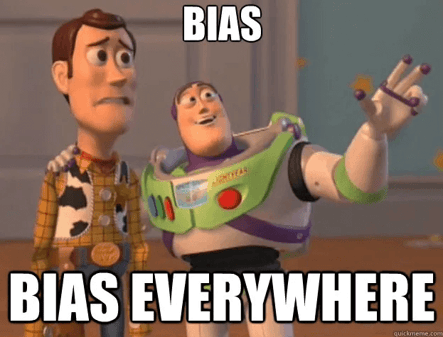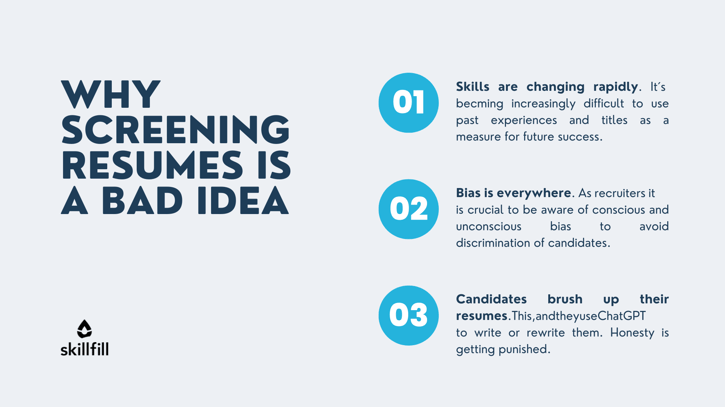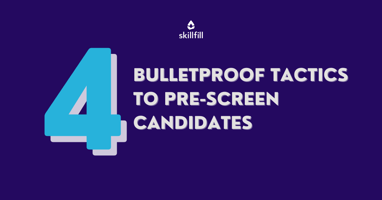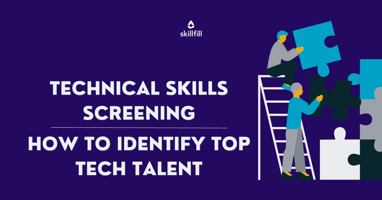The use of AI and tools like ChatGPT is surging, and recruiting is one of the most interesting use...
Why screening resumes leads to bias in hiring
The World Economic Forum paints a dramatic picture and shows how work life is changing. In their most recent Future of Jobs report, we can see that 50% of the skills required for a job will have changed by 2027. How does this relate to bias in resume and CV screening?
Looking at a resume or CV is a method that heavily relies on past experience, titles and degrees. The idea is that past success determines future success. This is not generally untrue, but we do make some very dangerous assumptions here:
- Skills that were useful in the past will help us remain successful
- Recruiters or hiring managers who screen resumes understand candidates´ skills and are not biased
- Candidates are able and willing to write a resume or CV that reflects the reality as close as possible
In this article I will break down all 3 points and show how screening resumes or a CV was and will always be a bad practice in terms of bias (... and damage your company in the long run).
In fact, the Burning Glass Institute published a study that shows how 31% of degree requirements were recently dropped. Companies started understanding that skills are more important than degrees or titles.
Do you make any of the assumptions mentioned above? If so, read on to understand why those assumptions are dangerous and you should reconsider old habits.
Skills are changing rapidly and become the new currency
Now let's go back to the starting point: 50% of the skills required for a job will have changed by 2027. What does it actually mean?
In my opinion titles are just that: titles. When I started my career as a data analyst, being good at Excel was in almost all cases just fine. Over the years, the field of data matured and got more complex, so the required skills of an entry data analyst now are very different from what they used to be.
Same story with degrees: If roles are changing so quickly, then how much of the knowledge you learned at university will actually really help you on the job? If we look at the IT sector in Germany, we see that around 8% of all employees don't have a formal qualification and are self-taught. Keep in mind that those are numbers from a country with easy access to a great and affordable public education system.
If you now think that the IT sector is an exception, think again: With the launch of ChatGPT, suddenly everyone felt the urgency to adapt, fearing they would fall behind if they didn't. Sentences like ´AI will not replace you, but people who don´t use AI will be replaced´ hold a lot of truth.
So what? The change we see in the labour market makes it close to impossible to infer from a CV whether someone will do a good job in the future in a certain role.
Little extra note: If you want to use AI tools such as ChatGPT to screen resumes, keep in mind that algorithms themselves are not biased, but the input used and people writing those algorithms can be. ChatGPT relies on public information and can show a strong bias in such a use case(!).
Bad news: We are all biased
Being clear about the job requirements got much harder
If we now consider that required skills are changing fast, this means that we need to deep dive into roles and learn about the requirements to be sure we are actually searching for the right profile. A bad practice that can often be seen is that job descriptions are recycled (or even worse: copy pasted from competitors), even if requirements changed. And this creates a first bias. Not being clear about requirements is not a good starting point, since you will not even aim to measure the right skills.
Even if requirements are clear: You are still a human being
By nature resumes and CVs hold personal information. In a resume bias study by the National Centre for Social Research, researchers showed that by changing the name and leaving all other information in a CV the same, there was a bias in 65% of the times, and minority groups had less chances of getting invited to an interview.
In another blog post I have written about gender bias in hiring in detail, and it turns out there are many more potential biases we can fall into. A great source that lists more potential bias types is the Harvard Business Review, that also shows how to overcome those biases in hiring.

Even more bad news: Many candidates brush up their CV
40% of candidates lied in a CV
According to Indeed an estimated 40% of candidates were tweaking information on their resume or CV to have an advantage over other candidates. Common lies affect the following information:
- Job titles and responsibilities
- Experience
- Dates of employment
- Qualifications
- Skills
- Reasons for leaving
- References
- Salary
ChatGPT invites to write resumes
ChatGPT is extremely popular and is not only used for motivation letters, but entire resumes and CV´s can be modified within a few seconds of work. According to a study already more than 50% of all job seekers are using ChatGPT to write resumes.
So what? Even if your hiring process is optimized, simply relying on a CV or resume introduces a big risk since candidates use new technologies and sometimes show unethical behaviour to get a job. In other words: Your hiring manager will waste their time interviewing non qualified candidates.
Reasons why resume screening leads to bias and how to avoid this bias
Putting all together, we can see how the labour market is changing rapidly and makes it harder for companies to understand the profiles they actually need. But even when this step is clear, having a hiring process that relies on screening resumes, you are inevitably introducing a bias. Now you might think that software can help you get rid of bias. It's somewhat true. Automated CV screening is using candidates´ resumes or CV´s as an input. As we have seen, with many candidates tweaking their CV, you would indirectly introduce a penalty for honest job seekers: Talent pipelines are then less lean and you need extra effort to distinguish between honest candidates and dishonest candidates in follow up interviews, which takes a lot of effort and time.

This is one of the reasons why skills-based hiring is on the rise and becomes the new standard in hiring. Check out how software such as skillfill.ai can help you implement skills-based hiring - click 👇 to get access to our software, which doesn’t use gender, age, race etc. as an input and is 100% bias-free!
AI-ASSISTED TALENT ASSESSMENT FOR TECH RECRUITERS
Start your 14-day free-trial today!



